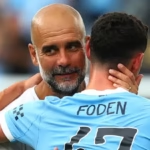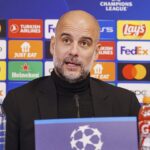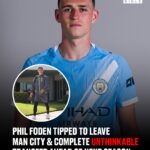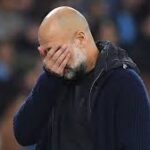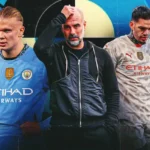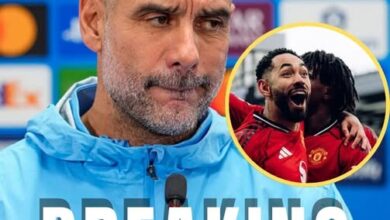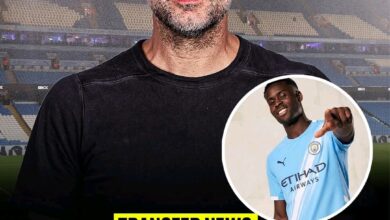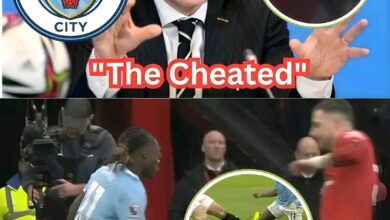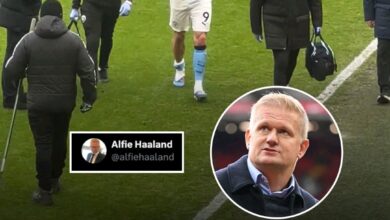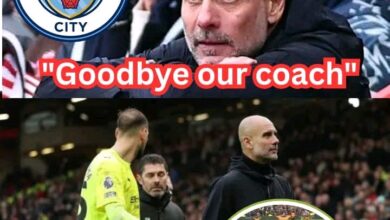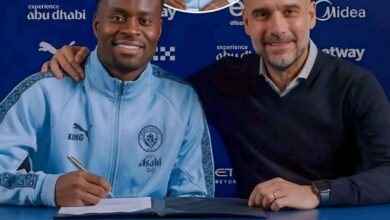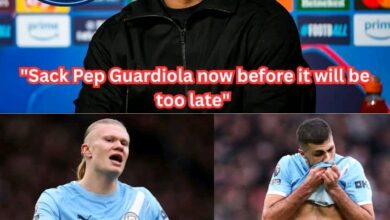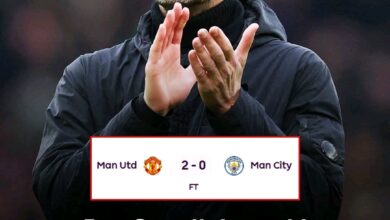Phil Foden’s Concerning Dip: A Season of Struggle After Last Year’s Brilliance
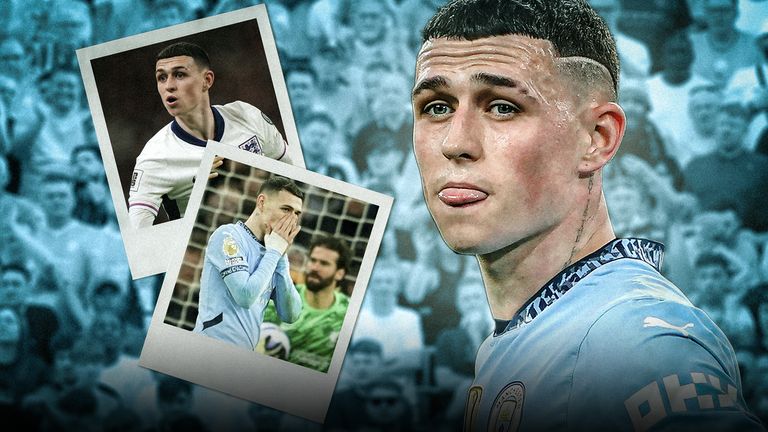
As Manchester City edge toward the conclusion of another grueling campaign, one story has quietly unfolded beneath the surface of their push for silverware: the concerning regression of Phil Foden, last season’s undisputed Player of the Year. The Stockport-born playmaker, who emerged as the beating heart of Pep Guardiola’s side during their historic four-in-a-row Premier League triumph last season, has struggled to recapture the magic that made him seem destined for footballing immortality just twelve months ago.
The statistics tell part of the story, but the full narrative runs deeper. A season that began with enormous expectations following his stellar performances for both club and country has instead become a cautionary tale about the physical and mental toll of modern football’s relentless schedule, particularly on young players who have been thrust into the spotlight from their teenage years.
“It has been a season to forget for Phil Foden,” acknowledges former City midfielder David Silva, who mentored Foden during his formative years at the Etihad. “And unfortunately, time is running out for him to turn things around before the season concludes.”
From Heroics to Hurdles: Tracing the Decline
The contrast between Foden’s 2023/24 campaign and his current form could hardly be more stark. Last season saw him notch 19 goals and 11 assists across all competitions, often producing decisive moments in City’s most critical fixtures. His ability to glide past defenders, orchestrate attacks from central areas, and finish with clinical precision had cemented his status as not just City’s present but their future—the homegrown talent who would eventually assume the mantle from Kevin De Bruyne.
That trajectory continued into the summer, where Foden finally found his place in the England setup during Euro 2024. After years of being underutilized or mispositioned by Gareth Southgate, he became instrumental in England’s run to the final, scoring three goals and providing two assists before their heartbreaking defeat to Spain in Berlin.
But the warning signs were already there. By the tournament’s conclusion, Foden had played nearly 70 competitive matches in a 12-month period—a physical burden that would test even the most resilient athletes. There was barely time to process the emotional disappointment of another international final defeat before pre-season preparations loomed.
“He spoke of mental burnout after the Euros and barely any rest between the previous few campaigns,” reveals a source close to the player. “The physical toll is obvious, but the mental fatigue can be even more debilitating, especially for someone who’s played non-stop high-pressure football since the age of 17.”
A False Start to a Forgettable Campaign
Unlike many of his international teammates who managed at least some preseason involvement, Foden was granted extended leave to recover—a necessity rather than a luxury given his condition. This meant beginning the season at a clear disadvantage, playing catch-up in terms of both fitness and tactical familiarity.
His 45-minute cameo against Chelsea on the Premier League’s opening day demonstrated this unpreparedness. Lacking his usual sharpness and struggling to find rhythm within City’s evolving tactical setup, Foden appeared a shadow of the player who had dominated English football just months earlier. This performance was followed by a three-game absence due to illness, further disrupting any chance of building momentum.
It wasn’t until late September that Foden started a match for City, and his first Premier League start didn’t arrive until October—nearly two months into the campaign. By this point, City had already established alternative attacking patterns without him as their focal point, and Guardiola had been forced to find solutions elsewhere.
“When you’re as integral to a team’s approach as Phil was last season, missing the preseason and first few months creates a significant void,” explains tactical analyst Michael Cox. “The team naturally adapts, other players step up, and suddenly you’re fighting not just for form but for your place in a reconfigured system.”
The Numbers Behind the Narrative
The statistical regression has been both obvious and concerning. At this point last season, Foden had contributed 15 goals and 8 assists in Premier League action alone. His expected goals (xG) and expected assists (xA) metrics were among the highest in the league, reflecting a player operating at the peak of his creative and finishing powers.
This term presents a far grimmer picture. His first Premier League goal didn’t arrive until an injury-time consolation at Aston Villa just before Christmas—a strike that did little to mask what had been, to that point, the least productive half-season of his professional career. A brief renaissance in January saw him net six goals in four games across all competitions, prompting hope that the real Phil Foden had finally arrived to the 2024/25 campaign.
That hope proved short-lived. Since that purple patch ended in early February, Foden has failed to find the net in seven consecutive league appearances, registering just two assists in all competitions. His expected goal involvement has dropped by nearly 60% compared to the equivalent period last season, and his successful dribbles, progressive passes, and touches in the opposition penalty area have all declined significantly.
“The hardest part to watch has been seeing his confidence erode,” says former City teammate Ilkay Gundogan. “Phil’s greatest attribute was always his fearlessness—he’d try things other players wouldn’t dare attempt. When that self-belief diminishes, everything else follows.”
Finding the Factors Behind the Fall
Several theories have emerged to explain Foden’s dramatic downturn in performance. The most obvious relates to physical and mental fatigue following years without proper rest. Since breaking into City’s first team as a teenager, Foden has participated in four consecutive Premier League title campaigns, two Champions League finals, a Club World Cup, and multiple international tournaments.
“He has played non-stop since he was 17, so a season like this shouldn’t really be a surprise,” notes sports physiologist Dr. Anna Williams. “The human body—even that of an elite athlete—has limits. We’ve seen similar patterns with other young players who experience early success and are subsequently overplayed.”
This explanation gains credibility when examining comparable cases. As Rico Lewis argued after City’s FA Cup semi-final victory over Nottingham Forest: “My own form has dipped this season due to injuries across the squad.” The ripple effects of fitness issues throughout Guardiola’s squad have forced tactical compromises and increased workloads for available players.
Looking beyond City, Cole Palmer’s trajectory at Chelsea offers another parallel. After his Young Player of the Year win and impressive performances for England at Euro 2024, Palmer’s form has notably declined since January—another example of a young player struggling with the aftermath of sustained high-intensity football without adequate recovery periods.
System and Style: A Tactical Mismatch
Beyond physical limitations, tactical factors have contributed to Foden’s struggles. Guardiola’s City has evolved this season in response to various challenges—including the absences of key players like Rodri and De Bruyne for extended periods—resulting in a more pragmatic approach that doesn’t always maximize Foden’s specific talents.
Last season, Foden thrived in a fluid attacking setup where he could drift between central and wide positions, finding pockets of space to receive the ball on the half-turn and drive at retreating defenses. This term, with City often prioritizing control and defensive solidity, those spaces have been more limited, and Foden has frequently found himself in more structured, restrictive roles.
“The system that gets the best out of Phil requires certain personnel around him,” explains former City coach Brian Kidd. “When Rodri is anchoring the midfield, De Bruyne is pulling strings ahead of him, and the inverted full-backs are providing width, Foden has the freedom to express himself. Without those elements in place, his influence naturally diminishes.”
Guardiola himself has acknowledged this challenge, though typically in his oblique fashion. “Sometimes the best players must adapt to what the team needs, not what they prefer,” he remarked after benching Foden for March’s crucial victory against Liverpool. “Phil knows what we require in each moment.”
The Competition Factor: Fresh Faces and Fierce Rivalry
Another significant factor in Foden’s reduced prominence has been the emergence and integration of other attacking talents within City’s squad. The arrivals of Jeremy Doku and Matheus Nunes, along with the continued development of academy graduate Oscar Bobb, have created unprecedented competition for the attacking positions Foden would typically occupy.
Doku, in particular, has offered a directness and unpredictability on the left wing that provides a different dimension to City’s attack. His ability to beat defenders in one-on-one situations has made him an increasingly important option in games where opponents set up in low defensive blocks—precisely the type of matches where Foden’s intricate passing and movement between lines might be neutralized.
Meanwhile, Bernardo Silva’s remarkable consistency and tactical intelligence have made him virtually undroppable in the right-sided attacking role that could otherwise accommodate Foden. With Julian Alvarez also competing for minutes in advanced midfield positions, the competition has never been fiercer.
“Pep has belatedly found a formula that works this season after all the injuries, and Foden isn’t part of it,” observes former City defender Joleon Lescott. “Nobody is asking the question that he should be in the team—like they are of Jeremy Doku, for example. That’s a significant shift in perception for someone who was untouchable just a year ago.”
Confidence Crisis: The Psychological Battle
Beyond physical fatigue and tactical considerations lies perhaps the most crucial factor in Foden’s decline: a visible erosion of confidence. The assured swagger that characterized his performances during City’s treble campaign and subsequent title defense has given way to hesitancy and second-guessing.
This psychological dimension was painfully evident during City’s Manchester derby defeat at Old Trafford in March. Subjected to taunting from United supporters and struggling to impose himself on the game, Foden appeared increasingly withdrawn as the match progressed, eventually suffering a knock that forced his substitution—a metaphor for his season in miniature.
“Football is 90% mental at the highest level,” suggests sports psychologist Dr. Helen Thompson. “When confidence dips, physical capabilities become almost irrelevant. Players make decisions a split-second slower, hesitate before attempting creative passes, and overthink situations they would previously have handled instinctively.”
The cumulative effect has been a player caught in a negative spiral: reduced playing time leading to diminished confidence, which in turn results in less effective performances when opportunities do arise, further justifying his omission from the starting lineup.
Guardiola’s Approach: Tough Love or Loss of Faith?
Pep Guardiola’s handling of Foden’s situation has raised eyebrows among some observers. Known for his meticulous player development and man-management, the Catalan coach has oscillated between public backing and pointed omissions when it comes to his prodigious playmaker.
“Phil will be back how he was, an amazing player,” Guardiola insisted after the FA Cup semi-final against Nottingham Forest, where Foden was restricted to a ten-minute cameo. Yet actions speak louder than words, and the decision to start crucial matches without City’s reigning Player of the Year suggests a pragmatic prioritization of immediate results over individual rehabilitation.
Foden’s body language at Wembley was telling. He was the first player to head to the team coach after the final whistle, betraying frustration at his peripheral role in what should have been another significant step toward silverware.
Some within City’s coaching staff have privately expressed concern that Guardiola’s approach could exacerbate Foden’s confidence issues. “There’s a fine line between challenging a player to respond and crushing their spirit,” suggests one source familiar with the dynamics at the City Football Academy. “Phil needs arm-around-the-shoulder management right now, not cold tactical calculations.”
Others defend Guardiola’s methods, pointing to his track record of revitalizing players who have experienced similar dips. “Pep sees the bigger picture,” argues former Barcelona midfielder Xavi. “Sometimes he must be cruel to be kind. He did similar things with me, with Bernardo, with many others who came back stronger.”
The Road to Recovery: What Next for Foden?
With the season entering its final stretch, opportunities for Foden to salvage something meaningful are dwindling. City remain in contention for both the Premier League title and FA Cup, but Guardiola’s successful formula without Foden as a starter makes a return to prominence unlikely before the summer.
“The hope will be that Foden rediscovers his confidence and freedom soon and can be stronger for his struggles this year,” says City legend Vincent Kompany. “Every great player experiences these challenges—it’s how they respond that defines their career.”
Looking further ahead, this summer’s expanded Club World Cup in the United States presents an interesting dilemma. The tournament, scheduled for June and July 2025, will further compress the football calendar and reduce recovery time before next season begins.
“There may even be an argument to leave him at home for the Club World Cup to help him reset,” suggests football writer Jonathan Wilson. “Although a tournament in the sun to become World Champions again could be what Foden needs. He thrived in Saudi Arabia in 2023 in the smaller edition of the Club World Cup.”
The precedent offers hope. Foden was instrumental in City’s triumph at the 2023 Club World Cup, scoring in both the semi-final and final to help secure the trophy. Perhaps a return to that environment—away from the pressure cooker of domestic competition—could provide the platform for rediscovery.
The Bigger Picture: English Football’s Burnout Problem
Foden’s struggles this season illuminate a broader issue affecting English football: the physical and mental toll of the sport’s increasingly congested calendar. As commercial imperatives drive the expansion of competitions and the reduction of off-seasons, players are paying the price with their bodies and performances.
“The footballing authorities talk about player welfare, but their actions suggest different priorities,” argues Professional Footballers’ Association chief executive Maheta Molango. “When we see players of Phil’s caliber struggling at 24 years old after years of relentless football, it should trigger serious concerns about sustainability.”
The introduction of more European fixtures, an expanded Club World Cup, and persistent resistance to meaningful schedule reform have created an environment where burnout is becoming normalized rather than addressed. Young English talents like Foden, Jude Bellingham, and Bukayo Saka are particularly vulnerable, having been thrust into first-team football at tender ages and expected to handle workloads previously unimaginable.
“We’re conducting a real-time experiment on these young players,” warns former England team doctor Dr. Mark Adams. “The human body isn’t designed for this intensity without proper recovery periods. The long-term consequences could be career-shortening.”
The Final Verdict: A Temporary Blip or Deeper Concern?
As City approach the season’s conclusion with their familiar ruthless focus on trophies, the Foden situation poses uncomfortable questions. Is this merely a temporary blip in an otherwise ascending career trajectory, or does it signal deeper concerns about his long-term development?
The evidence suggests the former. Players of Foden’s caliber rarely lose their fundamental qualities overnight, and at 24, he remains well within the developmental phase of his career rather than past his peak. The combination of accumulated fatigue, tactical evolution, and psychological factors provides a compelling explanation for his temporary regression.
“Nobody doubts that Foden will return to his best,” insists former City captain Richard Dunne. “The question is when, not if. This season may ultimately prove valuable in his development if it teaches him resilience and adaptability.”
For now, however, Foden must contend with his unfamiliar role as a squad player rather than the centerpiece. With a Champions League place to cement and an FA Cup final against Crystal Palace on the horizon, Guardiola’s blueprint for success appears to prioritize other options.
“He’s running out of time to convince his manager otherwise this season,” concludes former City striker Paul Dickov. “But football has a way of providing redemption stories. Don’t be surprised if Phil Foden returns next season and reminds everyone exactly why he was considered the future of English football.”
As Manchester City march toward another potential trophy-laden conclusion to their campaign, the subplot of their golden boy’s struggles continues to simmer beneath the surface. For Phil Foden, the challenge now is to transform this season of frustration into fuel for what comes next—reclaiming his status as City’s crown jewel and fulfilling the extraordinary potential that has never been in doubt.
Here at The Manchester Evening News, we’re dedicated to bringing you the best Manchester City coverage and analysis.
Make sure you don’t miss out on the latest City news by joining our free WhatsApp group. You can get the club’s breaking news and best analysis sent straight to your phone by clicking here to subscribe.
You can also subscribe to our free newsletter service. Click here to be sent all the day’s biggest stories.
And, finally, if you’d rather listen to our expert analysis then make sure to check out our Talking City podcast. Our shows are available on all podcast platforms, including Spotify and Apple Podcasts, and you can also watch along on YouTube.
